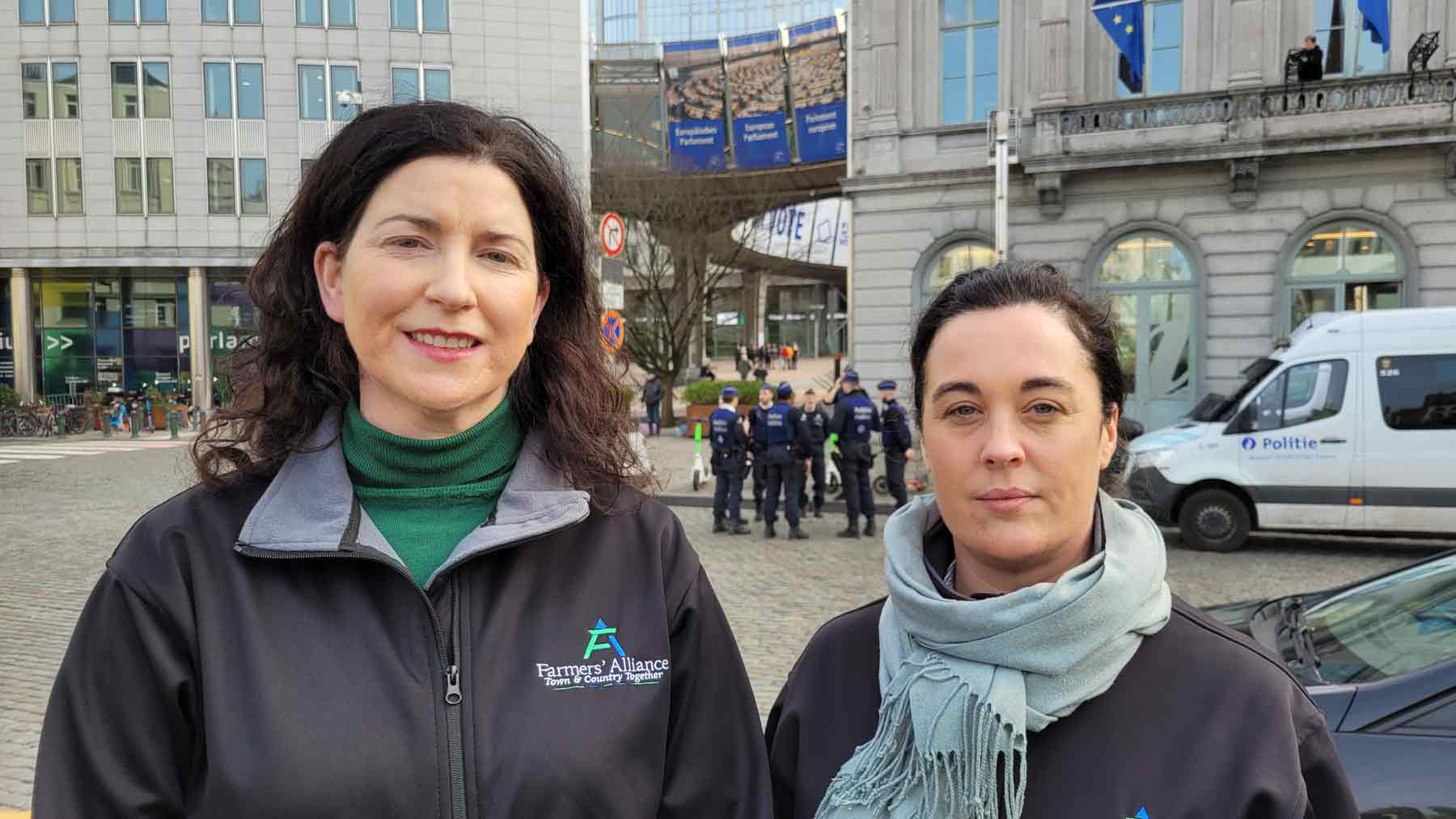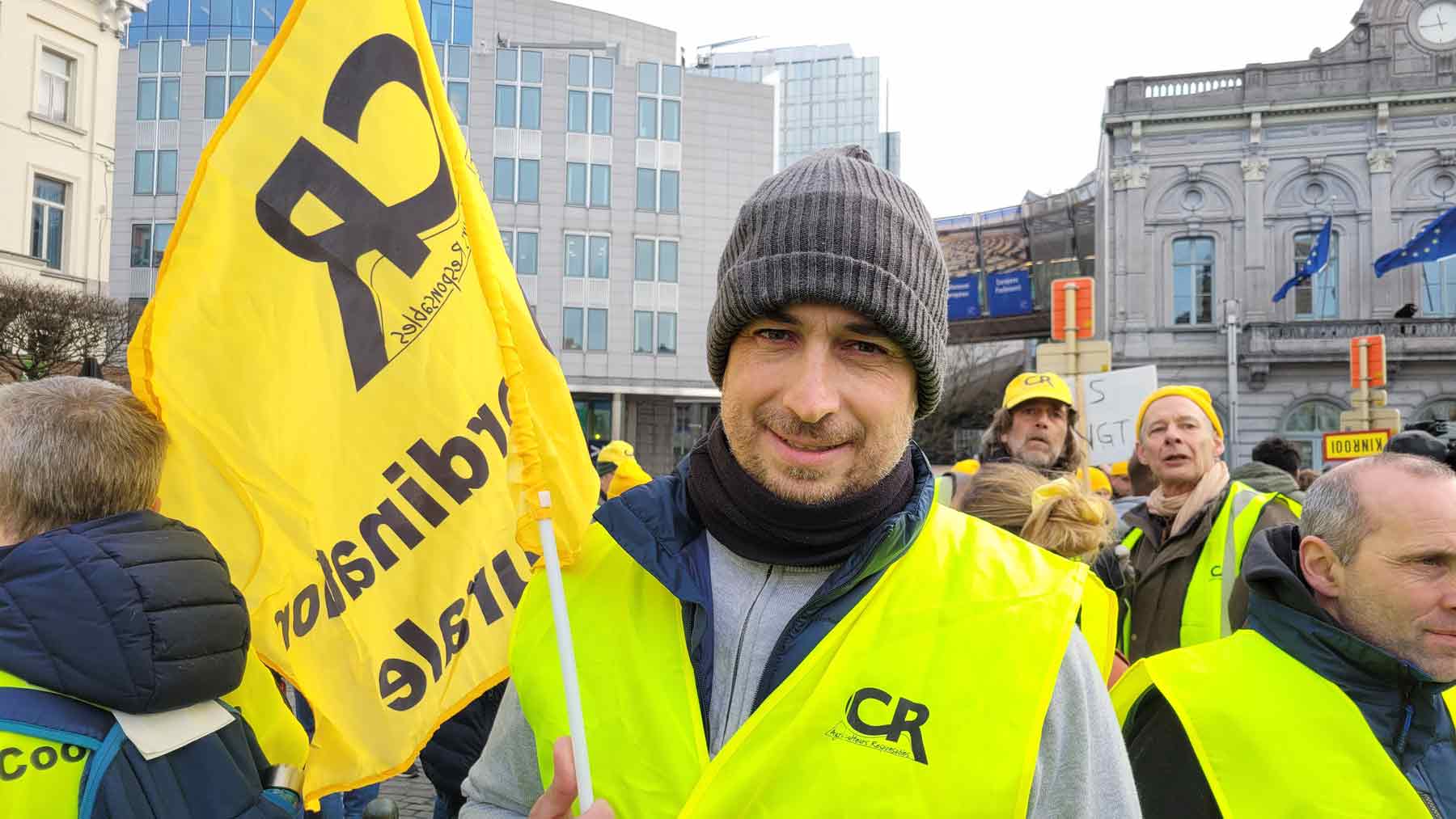The Europe-wide protests have reached the Belgian capital. Days after demonstrations erupted in France, Germany and other countries across the Continent, famers gathered in front of the European Parliament in Brussels on Wednesday to protest the bloc’s agricultural policies – with some denouncing the potential impacts of a European trade deal with South America.
The nascent agreement with South America’s Mercosur trade bloc – which includes Argentina, Brazil, Paraguay and Uruguay – was reached in 2019 after two decades of negotiations. And while the pact has yet to be ratified, Mercosur states are pushing to seal the deal by next month, according to a recent Politico report.
But many European farmers fear they will be disadvantaged by it, as their agricultural products are forced to compete with South American imports. For farmers like Helen O’Sullivan and Ana Mahe of the Farmers Alliance, a recently launched Irish political party, the Mercosur deal also signifies fresh regulations from Brussels and a raft of unnecessary environmental challenges.
“There’s just too much red tape coming from the European Union,” O’Sullivan, a co-founder of the party, said in front of the EP on Wednesday. “If the Mercosur deal does go through, that would mean that 99,000 tonnes of tariff-free beef are flooding into the EU. And so what about the carbon footprint of that?” Ireland, she argued, is “the most sustainable country in the whole world to produce food. We should be made the food island of Europe.”
Her colleague, Mahe, added: “It makes zero sense in terms of climate change, emissions reductions or food security in Europe, or healthy food for Europeans… why would you import beef from Brazil when it’s on your doorstep?”
 Helen O’Sullivan and Ana Mahe of the recently launched Irish political party Farmers Alliance joined the protest in Brussels. Photo: Julia Kaiser
Helen O’Sullivan and Ana Mahe of the recently launched Irish political party Farmers Alliance joined the protest in Brussels. Photo: Julia Kaiser
However, the details of the trade agreement paint a more nuanced picture, according to Oscar Guinea, senior economist at the European Centre for International Political Economy (ECIPE). The increased quota of beef that Mercosur farmers would export to the EU is very small, Guinea said, and would not make or break the sector.
Moreover, he argued, the agreement would simply realign trade flows. “We might buy more from Mercosur, but then less from other non-EU countries.”
The agricultural sector is not the only group with objections to the trade deal. Environmental NGOs have also raised concerns over the potential impact on the planet. But Guinea argued that the environmental aspect should be viewed more holistically. A broader free-trade agreement with South American countries would, for example, allow the EU to export more energy-efficient and technologically advanced products to South America.
We might buy more from Mercosur, but then less from other non-EU countries
For its part, the European Commission has said that EU farming communities would benefit from the agreement because it removes trade barriers such as high tariffs – in turn giving European producers access to the South American market.
“People in the Mercosur countries eat a lot of our products – our cheese, our wine, high-end agricultural products that we produce in Europe,” Guinea said. Just as with any trade agreement, he added, some sectors will lose out, while arguing that “overall both economies will benefit, because they tend to specialise in what they do better.” Spanish ham or prosciutto, for instance, would likely be highly attractive for South American consumers.
Still, farmers gathering at the EP this week had concerns beyond the trade deal. Olivier Senechel travelled to Brussels as part of the French farming union, Coordination Rurale. “In France, the government has decided to tax the gasoline for the tractors; something similar happened in Germany,” the 38-year-old from Nord-Pas-le Calais said.
 Olivier Senechel traveled to Brussels as part of the French farmers union Coordination Rurale. He opposes increased imports of agricultural products, as well as a French gasoline tax. Photo: Julia Kaiser
Olivier Senechel traveled to Brussels as part of the French farmers union Coordination Rurale. He opposes increased imports of agricultural products, as well as a French gasoline tax. Photo: Julia Kaiser
Farmers across France have demonstrated in protest at taxes and environmental regulations. Further protests are planned next week in the north of France, according to Senechel.
Franc Bogovič, a member of the European People’s Party (EPP) and member of the Committee on Agriculture and Rural Development, also joined the protests – as a farmer himself and former agricultural minister of Slovenia.
While he lamented European and national regulations that have weighed on farmers across the Continent, Bogovič argued that recent protests have been in part hijacked by far-right parties seeking political gain ahead of the EP election in June.
Far-right parties arrive and try to use this for votes for the next election. I hope the followers will recognise that we take care of them and bring solutions
“Far-right parties arrive and try to use this for votes for the next election. I hope the followers will recognise that we take care of them and bring solutions,” he said of the centre-right EPP.
Irish farmer O'Sullivan, however, pushed back against pigeonholing protesting farmers as representative of any political ideology. “There are too many labels going around. Anyone that has a different narrative of the EU or our own government, is labelled as far-right. We think this is wrong,” she said. “If you want to put a label on the Farmers Alliance here in Brussels today, it’s the common-sense label.”
Sign up to The Parliament's weekly newsletter
Every Friday our editorial team goes behind the headlines to offer insight and analysis on the key stories driving the EU agenda. Subscribe for free here.